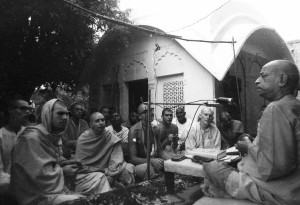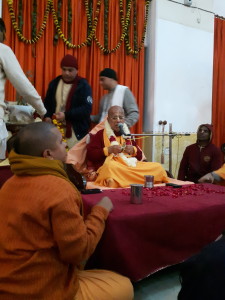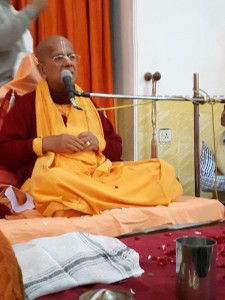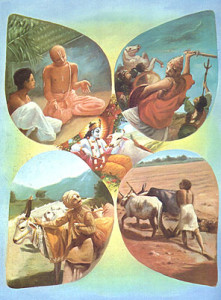Hare Krishna.
14th Feb, 2016. Gurgaon
‘sādhu-saṅga’, ‘sādhu-saṅga’ — sarva-śāstre kaya
lava-mātra sādhu-saṅge sarva-siddhi haya (CC Madhya 22.54)
“The verdict of all revealed scriptures is that by even a moment’s association with a pure devotee, one can attain all success.
One must be very meek and submissive and try to live peacefully by lending the ear to the speeches of the transcendentally self-realized soul who speaks on the message of Bhägavata-dharma, or the religion of glorifying the Supreme Lord and His devotees. To glorify a great man is a natural instinct for living beings, but they have not learned to glorify the Lord. Perfection of life is attained simply by glorifying the Lord in association with a self-realized devotee of the Lord.* The self-realized devotee is he who surrenders unto the Lord fully and who does not have attachment for material prosperity… It is imperative, therefore, that one sincerely seek the association of pure devotees and hear them patiently and submissively from any position of life. (Srimad-Bhägavatam Introduction)
The best association is the service of the devotees of the Lord, and by that association one can become the highest qualified man by the grace of the Lord’s pure devotees. As we have already seen in the life of Srila Närada Muni, he became the topmost devotee of the Lord simply by the association of pure devotees of the Lord. By birth he was the son of a maidservant and had no knowledge of his father and no academic education, even of the lowest status. But simply by associating with the devotees and by eating the remnants of their foodstuff, he gradually developed the transcendental qualities of the devotees. By such association, his taste for chanting and hearing the transcendental glories of the Lord became prominent, and because the glories of the Lord are nondifferent from the Lord, he got direct association with the Lord by means of sound representation… Therefore the Bhägavatam always recommends the association of the mahat, or the great soul, for opening the gate of salvation. (SB 2.10.41p)
..a pure devotee, who is preparing to transfer himself to the spiritual kingdom, is also freed from the association of the three modes of material nature. We have to seek the association of such devotees. For this reason we have begun the International Society for Krishna Consciousness. (SB 3.25.24p)
Let me share a recent experience. We were very fortunate that HH Gopal Krishna Goswami Maharaj visited Gurgaon temple on 25th December 2015. During the lecture Maharaj asked how many devotees read Bhagavad Gita daily. Many hands went up, but quiet less as a percentage considering the hall was packed with devotees. Maharaj then spoke about the importance of reading Bhagavad Gita daily and asked everyone to read at least one verse daily and then emphasised ‘with purport’. Now, since 2 years, I have been posting one Bhagavad Gita verse and its purport daily on a few whatsapp groups meant for preaching. Initially I would carefully read it myself but as time passed it became more or less a duty to post it so either I would read it hurriedly or just read the verse skipping the purport entirely. I would read the purport carefully only when someone in those whatsapp groups would ask a question from the purport. Sitting there in front of HH Gopala Krishna maharaj it really hit me that I am posting Bhagavad Gita verse daily for others to read but I am myself skipping the same. I thanked Maharaj in my heart, sought forgiveness from Srila Prabhupada, and promised that from now onward I will diligently read these daily verses I am posting. Now I have made it a point that even if I am in a hurry while posting the verse in the morning and can’t read it that particular time, I do not read anything else till I have read the daily verse. Suddenly reading the daily verse carefully has become a priority for me and it is enriching my minuscule devotional life. This is simply the result of association of a pure devotee, Maharaj’s words hit straight at my heart.
…the conclusion is that everyone can become a sädhana-siddha, a devotee of the Lord, simply by association with the pure devotees. ( SB 2.3.15p)
All glories to HH Gopala Krishna Goswami Maharaj.
All glories to Sri Guru and Gauranga.
All glories to Srila Prabhupada.




